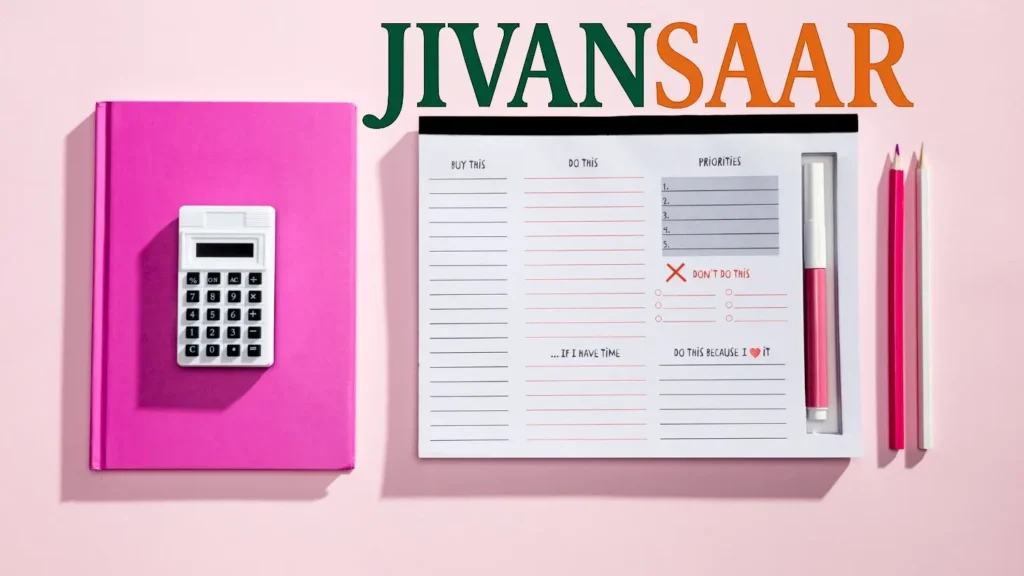
Budgeting tips for Americans are not just about pinching pennies — they are the foundation of a secure, less stressful life. Especially in 2025, when the cost of living in the U.S. continues to rise, having a smart plan for your money can mean the difference between surviving and thriving.
Whether you’re trying to stop living paycheck-to-paycheck or you dream of retiring early with complete financial freedom, these tips will help you build better money habits step by step.
This guide is brought to you by Jivansaar.com, where we’re committed to sharing practical insights about personal growth, wellness, and smarter living.
Table of Contents
1. Budgeting Tips for Americans: Know Exactly Where Your Money Goes

Before you can improve your finances, you have to see the full picture of your spending. Most people underestimate how much they spend on little things — a $5 coffee here, a $20 impulse buy there. Over time, these add up.
What to do:
- Track every dollar you spend for at least a month.
- Use free budgeting apps like:
Example:
You might realize you spend $200–$300/month on food delivery apps — money that could easily go into savings or investments.
Pro Tip: Take 10 minutes every Sunday night to review all transactions from the week. You’ll start spotting spending patterns fast.
Helpful Link:
MyMoney.gov Budgeting Tools
2. Build a Realistic Budget That You’ll Actually Stick To
A budget shouldn’t feel like a punishment or a diet. It should be a plan that respects your lifestyle while guiding you to better choices.
One popular method is the 50/30/20 Rule:
- 50% for Needs: rent, groceries, utilities
- 30% for Wants: dining out, streaming subscriptions, hobbies
- 20% for Savings and Debt Repayment
How to make it work:
- Adjust the percentages to fit your reality. If you have student loans or childcare costs, your “Needs” might be higher.
- Revisit your budget every 3 months to see if anything has changed.
Tool Tip:
Consider using a Budget Planner for 2025 or apps like PocketGuard that help you visualize your cash flow.
3. Build an Emergency Fund — Your Safety Net
Ask yourself: If your car broke down tomorrow, or you lost your job, could you cover your expenses without borrowing money?
More than 50% of Americans don’t have even $1,000 saved for emergencies. This leaves people vulnerable to debt spirals.
Your goal:
Save 3–6 months of living expenses in a high-yield savings account. This fund isn’t for vacations — it’s for true emergencies.
Top Savings Account Options:
Pro Tip: Set up automatic transfers of even $50–$100/month. Over time, it adds up faster than you think.
4. Automate Your Savings and Bills
One of the easiest ways to stay consistent with money goals is automation. When you don’t have to think about it, you don’t forget or procrastinate.
How to do it:
- Set up automatic payments for:
- Utilities
- Credit card bills
- Loan payments
- Create auto-transfers to:
- Savings account
- Retirement accounts (401(k), IRA)
- Investment platforms
Recommended Tools:
- Chime: Automates savings every time you get paid
- Acorns: Rounds up purchases and invests the spare change
- Fidelity: For automated retirement contributions
Why it works:
Automating removes the temptation to spend what you meant to save.
5. Cancel Subscriptions You Don’t Use
Subscriptions are sneaky. You sign up for a “free trial” and forget about it, only to find $10–$30 going out of your account every month.
What to do:
- Use apps like Rocket Money (formerly Truebill) to scan your accounts and show you all recurring charges.
- Cancel anything you haven’t used in the past month.
- Reevaluate subscriptions quarterly.
Examples of common waste:
- Streaming services you rarely watch
- Unused gym memberships
- Old software subscriptions
Potential Savings: $30–$100 a month you can reallocate to goals that matter more.
(Stay tuned for our upcoming guide on Subscription Services You Might Be Wasting Money On.)
6. Use Credit Cards Responsibly — Not Recklessly
Credit cards themselves are not the problem. Misusing them is.
3 Golden Rules:
- Always pay your full balance on time.
- Keep credit utilization below 30% of your limit.
- Choose cards that give you rewards or cashback.
Why does this matter?
- Responsible use improves your credit score.
- Better scores mean better loan rates and insurance premiums.
Top Cards Americans Love:
- Chase Freedom Unlimited
- Capital One Quicksilver
- Citi Double Cash
If you’re working on building credit, consider a secured credit card as a starting point.
7. Set SMART Financial Goals
A vague goal like “I should save more” doesn’t work.
Instead, set S.M.A.R.T. Goals:
- Specific
- Measurable
- Achievable
- Relevant
- Time-bound
Examples:
- Save $1,000 in 4 months for a vacation.
- Pay off a $2,500 credit card by December.
- Start investing $100/month into index funds.
Pro Tip:
Write down your goals and keep them visible — on your fridge, in your planner, or as a phone reminder.
8. Eat at Home to Save Money
Eating out 3–4 times a week can drain $300–$500 every month — money that could be paying off debt or funding your emergency savings.
How to make cooking easier:
- Plan meals for the week on Sunday.
- Use grocery delivery services to avoid impulse buys.
- Try meal-prep YouTube channels:
Challenge: Eat out no more than once a week for a month — then see how much you save.
9. Start Investing Early — Even Small Amounts Matter

The earlier you start, the more time compound interest has to work its magic.
Where to start:
- Index Funds (e.g., Vanguard VTI)
- Robo-advisors like Betterment or Wealthfront
- Your employer’s 401(k) or Roth IRA
Example:
If you start investing $50/month at age 25, you could have over $100,000 by retirement.
Educational Resource:
Investopedia – Beginner Investing Guides
10. Commit to Ongoing Financial Education
Money doesn’t come with a manual, but there are endless resources to help you grow.
Some of the best:
- The Psychology of Money by Morgan Housel
- I Will Teach You To Be Rich by Ramit Sethi
- Podcasts:
- Planet Money
- The Dave Ramsey Show
- Reddit:
Action Step:
Set aside 15 minutes every week to learn something new about money.
Want to Keep Learning?
Explore more trusted resources:
Or dive into more guides on our Finance & Earning section at Jivansaar.
Frequently Asked Questions (FAQs)
Q: Can I still budget if I have a low income?
A: Yes, 100%. Budgeting isn’t about how much you earn — it’s about how you plan and track what you spend. Even on a tight income, having a clear budget helps you feel more in control and avoid unnecessary debt. Just adjust the 50/30/20 rule to fit your real needs.
Read more on MyMoney.gov about budgeting on any income
Q: How much should I keep in an emergency fund?
A: Most financial experts recommend saving at least 3–6 months of your essential living expenses. This way, if you lose your job or face an unexpected bill, you’re covered without needing to borrow.
NerdWallet guide to building an emergency fund
Q: Is using a credit card a bad idea?
A: Not at all — it just depends on how you use it. The key is to pay your full balance every month and keep your spending under 30% of your credit limit. If you do that, credit cards can actually boost your credit score and earn you rewards.
Consumer Financial Protection Bureau: Credit Card Basics
Q: What free apps are good for budgeting?
A: A few popular ones are Mint, PocketGuard, and YNAB (You Need A Budget). These apps help you track your income and expenses automatically and make budgeting way simpler.
Investopedia list of top free budgeting apps
Q: Is it too late to start investing if I’m in my 30s or 40s?
A: Definitely not. In fact, a lot of people start investing seriously around this time. The sooner you begin, the more you’ll benefit from compound growth. Even small, consistent contributions can add up over the years.
Investor.gov beginner investing resources
Q: How can I cut down on subscription costs?
A: Subscriptions are sneaky — they add up fast. Use apps like Rocket Money to see everything you’re paying for each month. If you haven’t used something in a while, cancel it. That money is better off in your savings or investments.
Rocket Money official website
Final Thoughts
You don’t need to be a finance expert to take control of your money. All it takes is:
- A clear plan
- A few smart tools
- Consistent habits
Remember — progress beats perfection every time. Start with just one of these tips today. Your future self will thank you.
About the Author
Hi, I’m Omkar Yadav — the creator of Jivansaar.com. Over the years, I’ve been passionate about sharing simple, practical tips that help people improve their lives, especially when it comes to money and personal growth.
I believe you don’t have to be a finance expert to build good habits and feel more secure about your future. My goal is to make budgeting, saving, and smart living feel achievable for everyone.
When I’m not writing guides or exploring new ways to make life a little easier, you’ll probably find me reading, trying out new productivity tools, or enjoying good coffee.
Thanks for stopping by, and I hope you found this guide helpful.
Feel free to explore more resources here on Jivansaar, and let’s keep learning together!

Leave a Comment